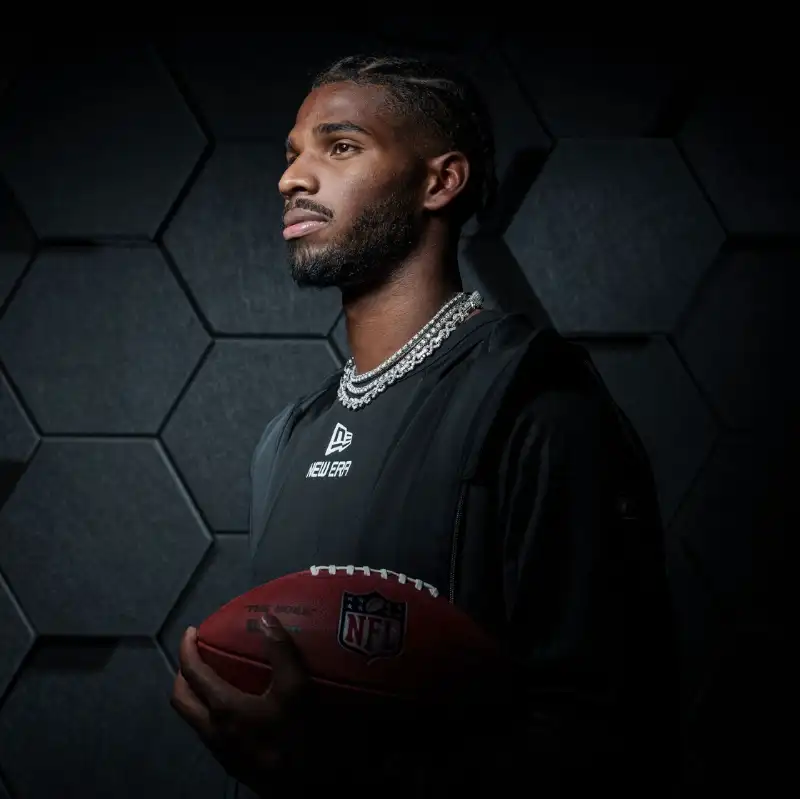The NFL draft has always been a spectacle, a place where dreams are realized and hopes can be dashed in a single evening. For Shedeur Sanders, son of the legendary Deion Sanders, it was supposed to be the culmination of an extraordinary college career one that saw him break records, win Big 12 Offensive Player of the Year, and become one of the most talked-about quarterbacks in the country. Yet, as draft night unfolded, Shedeur watched as team after team passed him by, his name dropping lower and lower on the board.
At his home in Canton, Texas, surrounded by family and friends, Shedeur hosted his own draft celebration eschewing the usual pomp in Green Bay for an event that felt personal and branded with his own “Legendary” logo. All 32 team hats were lined up, cameras were rolling, and hope filled the room. But what followed shocked nearly everyone: Shedeur, projected as a first-round pick, fell not just past the first, but the second, third, and even fourth rounds, until the Cleveland Browns finally selected him 144th overall.
On paper, it made no sense. This was a player with no major off-the-field scandals, a stellar stat line, and immense potential to boost any team’s media presence and ticket sales. So why did every team pass him over again and again? The uncomfortable answer, one rooted in the league’s long history and the wider culture surrounding it, is that Shedeur didn’t simply fall he was pushed.
The echoes of this treatment reach all the way back to draft day 1989, when Deion Sanders, dripping in gold chains and charisma, was drafted by the Falcons. Deion’s confidence was legendary, and his brand Prime Time was as much a part of his identity as his game-changing plays. For some, his boldness was inspiring; for others, it was seen as arrogance in need of correction.
It’s a lesson Shedeur seems to have inherited, for better or worse. Being the son of Deion Sanders brings enormous advantages connections, guidance, and the ability to build a personal brand. But it also comes with risks, especially when that confidence and self-belief are interpreted by some as cockiness, even entitlement. In the eyes of certain NFL decision-makers, humility at least, the appearance of it is still considered a prerequisite, especially for young Black men seeking stardom.
Despite his accomplishments and clean record, Shedeur became the target of what’s been called “know-your-place aggression” an insidious, often unspoken effort to remind ambitious Black athletes of their supposed place in the hierarchy. The fact that Shedeur represented himself in contract negotiations, bypassing the traditional agent system, likely didn’t help. The NFL, like many major institutions, often resists players who challenge its unwritten rules, especially those who dare to dictate terms or disrupt the established order. By dropping Shedeur in the draft, teams sent a message one that extends far beyond football.
Media reactions ranged from critiques of his “lack of humility” to open speculation about whether he “thought too highly of himself.” But at the heart of it was something deeper: the persistent discomfort with young, Black athletes who refuse to shrink themselves to fit the mold. History is filled with examples Muhammad Ali, Colin Kaepernick, Mahmoud Abdul-Rauf of Black sports figures punished for their outspokenness, activism, or simply refusing to “know their place.”
Shedeur’s draft saga unfolded in a season where power structures have become more emboldened, where diversity, equity, and inclusion initiatives are under attack, and where the pushback against Black excellence is increasingly open. In this context, the NFL’s snub of Shedeur Sanders reads as more than just a football decision it’s a reflection of broader societal anxieties and prejudices that have yet to be fully addressed.
But through it all, the Sanders family remained unbroken. Videos of Shedeur and his brother Shilo celebrating after finally hearing his name called by the Browns showed joy and resilience, not defeat. “Thank you for the fans. Thank you for everybody. Thank you for the Browns organization for giving me a chance,” Shedeur said, donning his new team’s cap. For now, that’s all he needs and perhaps, in the long run, that’s how legends are truly made.





